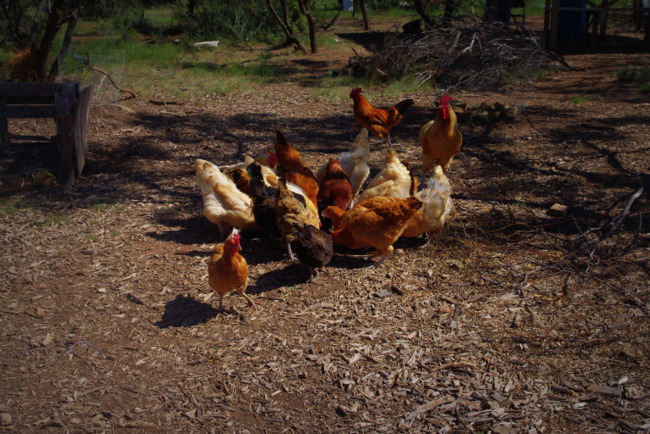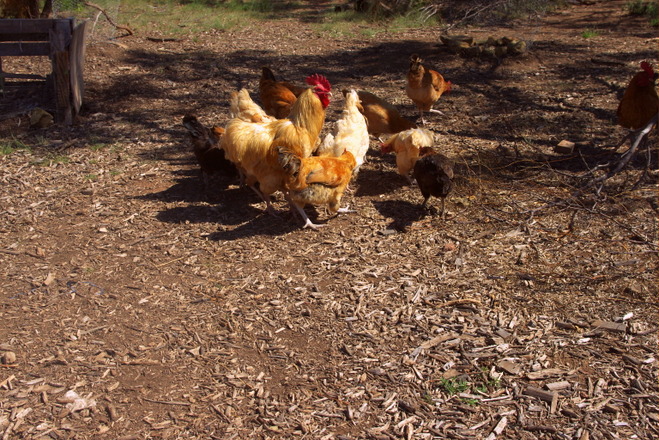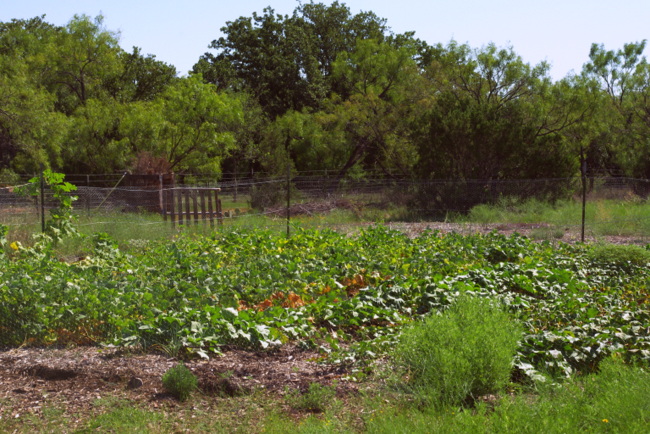How We Beat the Grasshoppers… so far
Note: This week only you can get 200 gluten and grain-free recipes in five eBooks for only $7.40.
I’ve never been a big animal person because I’m really jumpy and animals are really unpredictable. I generally try to put that aside, but there are three animals I just really don’t like to be around: cats, snakes, and grasshoppers. All of which are prevalent in Texas.
Last year the grasshoppers were a huge part of the utter failure of nearly every single thing we planted. The greens and the roots and the melons and the zucchini and the tomatoes and the peppers all went bye-bye shortly after they were planted.
This pretty much was the icing on the I-hate-grasshoppers cake.
We knew it was possible to overcome this because, well, we had to. And because there were others in our area who really weren’t struggling with it the way we were.
And then we heard someone say “A grasshopper problem is a lack of poultry and groundcover problem.”
Bingo. We couldn’t change the groundcover situation overnight, but we did need more egg-layers and so more chickens was a natural solution.
So, we purchased some more laying hens and about 30 chicks. And ya know what? When you walk outside of our fence and down the road they jump and fly and swirl around you like the evil little buggers that they are. But when you walk through the free-ranged fenced in area there are very, very few grasshoppers.
And the greens and the roots and the melons and the zucchini and the tomatoes are all still alive, or at least were not eaten by grasshoppers.
Now we just need to figure out how we’re going to feed all of these chickens now that their main buggy protein source has been all but eaten up.





I HATE grasshoppers also! Blah!
I raise rabbits, and we will be adding ducks & chickens by next year. I’ve been researching fodder for them, since I want to be off pellet food by 2015; duckweed, and forage trays may be extremely beneficial in supplementing or outright feeding your chickens.
Here’s some info on duckweed: http://www.bioponica.net/Liquid-Plant-Fertlizer-s/1844.htm
And on forage: http://www.half-pinthomestead.com/FodderKits.html
I wouldn’t buy a system for either purpose, but just getting ideas for repurposing food grade barrels to build my own.
Good luck! 🙂
Boy do you have well behaved chickens! Ours don’t eat the bugs so much, they just scratch up the plants. Some years ago in central Queensland, Australia, we’d have grasshopper plagues every year – they decimated everything in their path and left bare dust bowls behind. The army would be sent in to spray them. Good luck feeding the chicks and congratulations on the beautiful garden.
Priscilla – Well, one key thing that I didn’t mention is that all of our garden areas are fenced in from the chickens. We do, on occasion, bring them into the gardens to eat some of those buggers, but only when we’re supervising. Ugh that grasshopper plague sounds like such a nightmare. I can’t say ours was that bad last year.
Have you had trouble keeping your chickens safe from predators? I have a friend who has given up on keeping chickens, for now at least, due to this issue. I grew up with chickens, and besides providing fresh eggs, they were very effective at keeping the insect population down.
Sounds like chicken dinner time.
I live in North Texas on 2 acres, and we have a huge garden. The 1st 2 years we were here, we had the grasshopper plague – when you walked out in the yard, a cloud of grasshoppers would blot out the sun. We also had horrific drought conditions. I tried everything. For drought, I bought soaker hoses and ran them on top of the ground in my beds. Then I covered them with newspapers and topped it off with straw. I built wire cages for my peppers and susceptible plants and wrapped them with fiberglass window screening. It saved my plants, even though the grasshoppers ate through the screening by end of season! I crocheted covers with drawstrings to put around my peaches after I discovered the grasshoppers would eat through the plastic mesh bags I thought would deter them. We were the only people in the area that had a successful garden, but boy was it work! The crocheted covers work great; I use them every year (have to make more as our trees produce more). I always mulch with straw – cheap and effective.
Shannon,take a look at Chiot’s Run website for info on growing mealworms for her chickens for the winter.